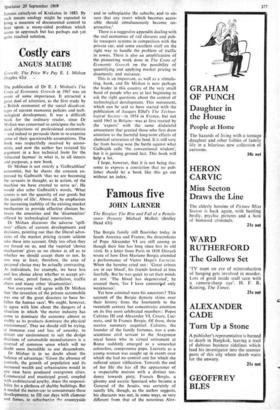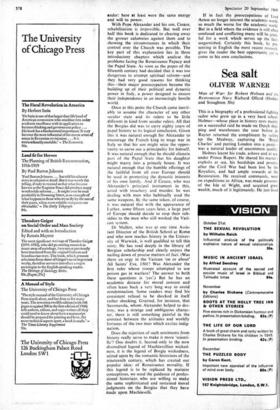Famous five
JOHN LARNER
The Borgias: The Rise and Fall of a Renais- sance Dynasty Michael Mallett (Bodley Head 63s)
The Borgia family still flourishes today in South America and France; the descendants of Pope Alexander VI are still among us though their line has long since lost its old
In a letter from Paris in 1838 Disraeli wrote of how Don Mariano Borgia attended a performance of Victor Hugo's Lucrezia. When the heroine cried out: 'Great crimes are in our blood', his friends looked at him fearfully. But he was quick to set their minds at rest. 'The blood has degenerated', he assured them, 'for I have committed only weaknesses'.
Yet how criminal were his ancestors? This account of the Borgia dynasty skims over their history from the fourteenth to the twentieth century but concentrates attention on its five most celebrated members : Popes Calixtus III and Alexander VI, Cesare, Luc- rezia, and St Francis Borgia. Of these, three receive summary acquittal. Calixtus, the founder of the family fortunes, was a con- scientious civil servant to the Aragonese royal house who in virtual retirement at Rome suddenly emerged as a somewhat colourless, compromise pope. Lucrezia as a young woman was caught up in events over which she had no control and for which she suffered unjust vilification. Towards the end of her life she has all the appearance of a respectable matron with a distinct ten- dency towards piety. Francis Borgia, a gloomy and ascetic Spaniard who became a General of the Jesuits, was certainly of saintly life, though, as the author suggests, his character was not, in some ways, so very different from that of the notorious Alex-
ander: here at least were the same energy and will to power.
With Pope Alexander and his son, Cesare, rehabilitation is impossible. But well over half this book is dedicated to clearing away the grosser calumnies against them and to showing the circumstances in which their control over the Church was possible. The key part of this explanation lies in three introductory chapters which analyse the problems facing the Renaissance Papacy and the Papal State. As soon as the popes of the fifteenth century had decided that it was too dangerous to attempt spiritual reform—and they had very good reasons for thinking this—their major preoccupation became the building up of their political and dynastic power in Italy, a power designed to ensure their independence in an increasingly hostile world.
Once at this point the Church came inevit- ably to assume the character of any other secular state and its rulers to be little different in kind from secular rulers. All that the Borgias did was to carry eighty years of papal history to its logical conclusion. Given this it was natural, enough for Alexander to encourage the French king to wage war in Italy so that his son might seize the oppor- tunity to carve out a principality for himself. It was natural enough that he should alienate part of the Papal State that his daughter might marry into a princely house. It was natural enough that the humble offerings of the faithful from all over Europe should be used in promoting the dynastic interests of his own family. And if Cesare, who was Alexander's principal instrument in this, acted with treachery and murder, he was dealing with men who habitually used the same weapons. By the same token, of course, it was natural that with the appearance of Luther, some fifteen years later, a large part of Europe should decide to stop their sub- sidies to the men who still worked the Vati- can system.
Dr Mallett, who was at one time Assis- tant Director of the British School at Rome and who now teaches history in the Univer- sity of Warwick, is well qualified to tell this story. He has read deeply in the library of Borgian scholarship and clearly enjoys the nailing down of precise matters of fact. (Was there an orgy in the Vatican 'on or about' All Saints' Eve, 1501? Was Alexander the first ruler whose troops attempted to use poison gas in warfare? The answer to both these questions is `yes'.) But he has an academic distaste for moral censure and often leans back a very long way to avoid condemnation. Some readers may find his consistent refusal to be shocked in itself rather shocking. Granted, for instance, that Savonarola, whom Alexander helped to des- troy, was a- strange and ambiguous charac- ter, there is still something painful in the contrast between the attitudes and worldly fortunes of the two inen which excites indig- nation.
Does the rejection of such sentiments from history really serve to make it more 'scienti- fic'? One doubts it. Second only to the now discredited legend of Machiavellian wicked- ness, it is the legend of Borgia wickedness, seized upon by the romantic historians of the nineteenth century, which has created our popular ideas of Renaissance morality. If this legend is to be replaced by maturer conceptions, we need the guidance of profes- sional historians who are willing to make the same sophisticated and sustained moral judgments on the Borgias that they have made upon Machiavelli.
If in fact the preoccupations of Lord Acton no longer interest the academic world. so much the worse for the academic world. But in a field where the evidence is still often 'confused and conflicting many will be grate. ful for a work which serves up the facts ungarnished. Certainly this book, by pre- senting in English the most recent research, gives the reader the best opportunity yet to come to his own conclusions.









































 Previous page
Previous page